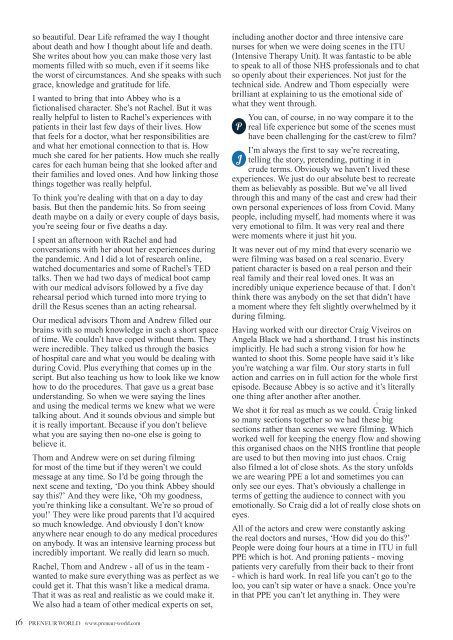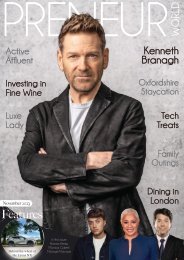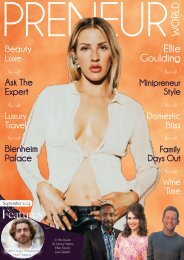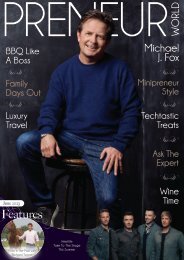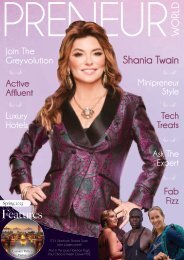Preneur World March 2024
In this issue: Celebrity Interviews with business tycoon Lord Alan Sugar, much-loved comedian Alan Carr and award-winning actress Joanne Froggatt. The judges and stars of Dancing On Ice. Features on Hair & Beauty, Male Grooming, Collagen Supplements, Active Affluent, Spring Fragrances, Kitchen & Home, Family Days Out, Staycation at The Red Lion in Hellidon, Luxury Safari at Chobe Game Lodge, Gateway to the Sahara at The Residence Douz in Tunisia, Kids Fashion in Minipreneur Style, Toys & Games in Minipreneur's Playroom, Children's Book Reviews in Minipreneur's Book Corner, Ask The Expert, Food & Drink, Recipes, Restaurants and Easter Gift Guide.
In this issue: Celebrity Interviews with business tycoon Lord Alan Sugar, much-loved comedian Alan Carr and award-winning actress Joanne Froggatt. The judges and stars of Dancing On Ice. Features on Hair & Beauty, Male Grooming, Collagen Supplements, Active Affluent, Spring Fragrances, Kitchen & Home, Family Days Out, Staycation at The Red Lion in Hellidon, Luxury Safari at Chobe Game Lodge, Gateway to the Sahara at The Residence Douz in Tunisia, Kids Fashion in Minipreneur Style, Toys & Games in Minipreneur's Playroom, Children's Book Reviews in Minipreneur's Book Corner, Ask The Expert, Food & Drink, Recipes, Restaurants and Easter Gift Guide.
- No tags were found...
Create successful ePaper yourself
Turn your PDF publications into a flip-book with our unique Google optimized e-Paper software.
so beautiful. Dear Life reframed the way I thought<br />
about death and how I thought about life and death.<br />
She writes about how you can make those very last<br />
moments filled with so much, even if it seems like<br />
the worst of circumstances. And she speaks with such<br />
grace, knowledge and gratitude for life.<br />
I wanted to bring that into Abbey who is a<br />
fictionalised character. She’s not Rachel. But it was<br />
really helpful to listen to Rachel’s experiences with<br />
patients in their last few days of their lives. How<br />
that feels for a doctor, what her responsibilities are<br />
and what her emotional connection to that is. How<br />
much she cared for her patients. How much she really<br />
cares for each human being that she looked after and<br />
their families and loved ones. And how linking those<br />
things together was really helpful.<br />
To think you’re dealing with that on a day to day<br />
basis. But then the pandemic hits. So from seeing<br />
death maybe on a daily or every couple of days basis,<br />
you’re seeing four or five deaths a day.<br />
I spent an afternoon with Rachel and had<br />
conversations with her about her experiences during<br />
the pandemic. And I did a lot of research online,<br />
watched documentaries and some of Rachel’s TED<br />
talks. Then we had two days of medical boot camp<br />
with our medical advisors followed by a five day<br />
rehearsal period which turned into more trying to<br />
drill the Resus scenes than an acting rehearsal.<br />
Our medical advisors Thom and Andrew filled our<br />
brains with so much knowledge in such a short space<br />
of time. We couldn’t have coped without them. They<br />
were incredible. They talked us through the basics<br />
of hospital care and what you would be dealing with<br />
during Covid. Plus everything that comes up in the<br />
script. But also teaching us how to look like we know<br />
how to do the procedures. That gave us a great base<br />
understanding. So when we were saying the lines<br />
and using the medical terms we knew what we were<br />
talking about. And it sounds obvious and simple but<br />
it is really important. Because if you don’t believe<br />
what you are saying then no-one else is going to<br />
believe it.<br />
Thom and Andrew were on set during filming<br />
for most of the time but if they weren’t we could<br />
message at any time. So I’d be going through the<br />
next scene and texting, ‘Do you think Abbey should<br />
say this?’ And they were like, ‘Oh my goodness,<br />
you’re thinking like a consultant. We’re so proud of<br />
you!’ They were like proud parents that I’d acquired<br />
so much knowledge. And obviously I don’t know<br />
anywhere near enough to do any medical procedures<br />
on anybody. It was an intensive learning process but<br />
incredibly important. We really did learn so much.<br />
Rachel, Thom and Andrew - all of us in the team -<br />
wanted to make sure everything was as perfect as we<br />
could get it. That this wasn’t like a medical drama.<br />
That it was as real and realistic as we could make it.<br />
We also had a team of other medical experts on set,<br />
including another doctor and three intensive care<br />
nurses for when we were doing scenes in the ITU<br />
(Intensive Therapy Unit). It was fantastic to be able<br />
to speak to all of those NHS professionals and to chat<br />
so openly about their experiences. Not just for the<br />
technical side. Andrew and Thom especially were<br />
brilliant at explaining to us the emotional side of<br />
what they went through.<br />
P<br />
You can, of course, in no way compare it to the<br />
real life experience but some of the scenes must<br />
have been challenging for the cast/crew to film?<br />
I’m always the first to say we’re recreating,<br />
J telling the story, pretending, putting it in<br />
crude terms. Obviously we haven’t lived these<br />
experiences. We just do our absolute best to recreate<br />
them as believably as possible. But we’ve all lived<br />
through this and many of the cast and crew had their<br />
own personal experiences of loss from Covid. Many<br />
people, including myself, had moments where it was<br />
very emotional to film. It was very real and there<br />
were moments where it just hit you.<br />
It was never out of my mind that every scenario we<br />
were filming was based on a real scenario. Every<br />
patient character is based on a real person and their<br />
real family and their real loved ones. It was an<br />
incredibly unique experience because of that. I don’t<br />
think there was anybody on the set that didn’t have<br />
a moment where they felt slightly overwhelmed by it<br />
during filming.<br />
Having worked with our director Craig Viveiros on<br />
Angela Black we had a shorthand. I trust his instincts<br />
implicitly. He had such a strong vision for how he<br />
wanted to shoot this. Some people have said it’s like<br />
you’re watching a war film. Our story starts in full<br />
action and carries on in full action for the whole first<br />
episode. Because Abbey is so active and it’s literally<br />
one thing after another after another.<br />
We shot it for real as much as we could. Craig linked<br />
so many sections together so we had these big<br />
sections rather than scenes we were filming. Which<br />
worked well for keeping the energy flow and showing<br />
this organised chaos on the NHS frontline that people<br />
are used to but then moving into just chaos. Craig<br />
also filmed a lot of close shots. As the story unfolds<br />
we are wearing PPE a lot and sometimes you can<br />
only see our eyes. That’s obviously a challenge in<br />
terms of getting the audience to connect with you<br />
emotionally. So Craig did a lot of really close shots on<br />
eyes.<br />
All of the actors and crew were constantly asking<br />
the real doctors and nurses, ‘How did you do this?’<br />
People were doing four hours at a time in ITU in full<br />
PPE which is hot. And proning patients - moving<br />
patients very carefully from their back to their front<br />
- which is hard work. In real life you can’t go to the<br />
loo, you can’t sip water or have a snack. Once you’re<br />
in that PPE you can’t let anything in. They were<br />
16 PRENEUR WORLD www.preneur-world.com


